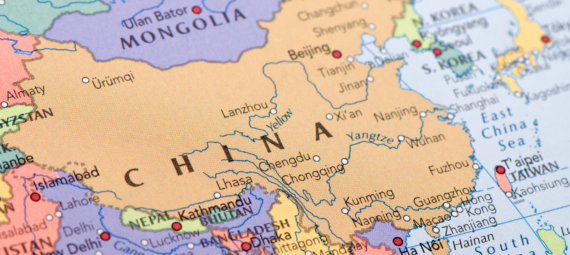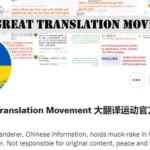What follows is an interview with L. M., a Chinese citizen living and working in Shanghai. As for his/her request, I will not disclose his/her real identity or gender.
L.M. is a highly educated person in their mid-thirties and he/she has lived his/her entire life in China. In our conversation we discussed important current issues such as the Covid pandemic, freedom of speech and press in China and Russia’s invasion of Ukraine, from a Chinese perspective. L.M. Is critical of the Chinese regime and his/her opinions on these issues do not reflect those of the Chinese government.
[Enrico Fode] Hi L. M., and thank you for agreeing to this interview! I would like to start with a broad question.
[L.M] Sure.
[Enrico Fode] Have you experienced changes in how free you have been in your daily life in China in the last ten years? Were things better in the past than they are now?
[E.d. Most political analysts agree that in the ten years of presidency of Chinese current leader Xi Jinping, China has experienced an authoritarian shift, which reverted the limited progress towards liberalism that characterized the years between the late ’80s and the early 2000.]
[L.M.] Ten years ago people could discuss democracy relatively freely, they could discuss how good or bad was life in China and abroad, on social networks for example. But now any messages that depict China in a bad way disappear.
The list of the so-called “sensitive words” online is one hundred times bigger than it was ten years ago. And when I use WeChat [E.d. One of the most common apps in China, which can be describe as a mix between Facebook and What’s App], if I write something that includes any of the censored words, I can send it but the receiver will not see it. And that is automatic, meaning that I do not know whether they received it or not, because on my screen the messages appear as ‘sent’. So how can I know whether I succeeded in sending the message? I have to log in on WeChat on my phone and on my computer at the same time. I send through one, either the computer or the cellphone, and I check with the other. If the other device also shows that I sent the message, that means that I succeeded in sending the message. If I don’t see the message I just sent on the other device, that proves that the message did not go through.
Also, in some good Chinese webpages dedicated to videos [E.d. the Chinese versions of YouTube], there used to be many well translated videos from abroad. But now most of them have been removed and one can no longer access them. Also, because of the growing number of sensitive words that I mentioned earlier, many videos are automatically blocked when someone tries to upload them.
In the past, things were not as bad as they are today. More than ten years ago, when accidents happened, for example when two high-speed trains clashed in Wenzhou, in Zhejiang province, many official Chinese mass media covered the story in real time. And they were also bold enough to criticize the way the rescuing process was being carried out by the government. And ordinary people could see that everyday on TV. But now, no journalists are allowed on site. First, the government blocks the place of the accident and journalists cannot record videos, make interviews or cover the story in any way, and they do not have the courage to do so, because they are threatened in their workplace and in their private lives. The current mass media and journalists have only the right to report the government’s official statements. In other words, they are like living microphones instead of people who have the right to think independently.
But was it good back then? I don’t think so. The difference between now and ten years ago or earlier is that back then, to some degree, they allowed people to say something and complain. But they never solved the problems people were complaining about. Because they don’t care, it is all the same for them. That does not mean that they were more liberal back then. They have always been arrogant and they completely disrespect the Chinese people.
[Enrico Fode] Do people know what they can say and what they cannot say, online and offline? What are the consequences for criticizing the government or the system?
In other words, are people more often censored or they mostly censor themselves?
[L.M.] Both. They censor themselves because they know they would be censored. Because they have been censored for so long, they grew accustomed to censor themselves. People have been trained little by little, for a long time.
[Enrico Fode] Are people in China aware of what is really happening in Tibet and Xinjiang? Significant evidence points at a level of repression there that is much higher than in the rest of China, especially for Tibetans and Uighurs.
[E.d. Tibet is currently the least free territory in the world according to the Freedom House Report, 2022. Xinjiang is not far behind. The existence of concentration camps in Xinjiang, which are estimated to have ‘hosted’ between one and two million Uighurs in the last few years, was finally acknowledged by the CCP in 2018. The Chinese government, however, calls them “vocational re-education centres”]
[L.M.] Absolutely not, they don’t believe a word of those things. About that, most people believe the government’s propaganda. For example, one student who now studies economics in Shanghai, knows some Uighur students who study in his university. And those students also say they didn’t see anything.
I also have one coworker who comes from Xinjiang. She is not an Uighur, but she studied with many Uighurs in her youth. She also does not believe that the concentration camps really exist.
[Enrico Fode] What do you think people in China would think if they knew that around two million Uighurs had been held in concentration camps in Xinjiang in the last few years? Or that some people in Tibet are in prison simply for owning a picture of the Dalai Lama? Or that more than one million Tibetan children have been forcefully taken away from their families to be sent to boarding schools outside of Tibet where they are systematically brainwashed with the CCP’s version of Tibetan history? Do you think they would agree with these and other similar policies if strong evidence of their existence was presented to them?
[L.M.] Based on my personal experience, they would definitely refuse to believe that. They would say that the so-called strong evidence or proofs is false, that it was forged by westerners. In other words, the strong evidence in their eyes is not strong, as long as they strongly believe the Chinese official version of the facts. But some of them would be awakened by the strong evidence, and they would be against those policies. But not all the policies, only some.

[Enrico Fode] While the things that happen in Tibet and Xinjiang are easily kept hidden from the general population that does not experience them directly, the same cannot be said for the lock§down policies. Hundreds of millions of Chinese are or have been subjected to these policies in the last two years, and recently these policies got stricter and involved bigger cities such as Shanghai and now even the capital Beijing. You have yourself experienced this in Shanghai. In fact, at the time of this interview, you are still quarantined, despite testing negative on multiple tests. What is people’s reaction to these policies? Do people support them? Tell us about your personal experience…
[E.d. Under the Chinese government Covid policies, even for just a few cases, the entire population of a city can be put into house quarantine. People are then kept in quarantine for weeks despite testing negative. Those who test positive are taken to hospitals even if they show no symptoms, and they have to stay there until they test negative again. Close contacts with positive cases are immediately tested and if the result is negative they are taken to special quarantine structures where they have to spend at least two weeks and be submitted to regular tests. In the case of Shanghai, most of these structures are located in other provinces, due to lthe ack of proper facilities within the city.]
[L.M.] They support the strict lock-down policies, and they support the decisions of the central government. They are only angry about how those policies are carried out. More specifically, they believe that the strict lock-down policies are necessary, and they think that the fault for the chaos in Shanghai rests upon the local government, for its recklessness. They never think that the chaos has to do with the policies. That is the typical mindset of Chinese people. They cannot understand the logic behind the policies. They just superficially accept what is shown to them.
There have been always catastrophes throughout Chinese history, and people always thought that the will of the emperor or the central government is good, and that bad results only come from a bad implementation of that will by the local governments.
They are so afraid of the virus, of living with the virus… in their minds they still believe CCP’s propaganda which says that the virus is extremely dangerous. In their minds living with the virus is a reckless decision by western governments, and the West is in decline because it cannot even win over the virus and it surrendered to it before it could achieve victory. And they think that western countries no longer care about the safety of their people, which in their minds is a sign of the upcoming fall of the so called western world.
They think their government, the CCP government, is creating more pragmatic policies. Many people in my neighborhood are planning to go back to their hometowns because they think that the Shanghai government didn’t lock down the city in time at the beginning of this new Covid wave, and they think that if the Shanghai government did what other cities did, the result would have been different.
[Enrico Fode] There have been many videos circulating that show people in Shanghai protesting. What were they protesting against?
[L.M.] Against the lack of food and other provisions.
[Enrico Fode] I see. So would you say that they mostly agree with the policies that have been implemented in Shanghai but not with how they have been carried out?
[L.M.] Yes. They are angry because the policy was not implemented in time and for the the way it is has been carried out.
[Enrico Fode] Can you tell us more about your experience living in Shanghai during the lock-down?
[L.M.] I work online from my room in my shared flat. I am not allowed to leave the room except when I have to receive a swab. I cannot go to the corridor or outside. Before the beginning of the lock-down, I stocked up on food and provisions for my daily life, so during this lock-down I have had enough food.
The price of food increased during the lock-down. For example, the price for industrially processed food doubled and the price for fresh vegetables and fruit is now three to four times higher.
We received food from the local government two times. And an interesting thing is that when they came to bring the food, they told us that we should thank the party and the government for it.
[Enrico Fode] How many swabs have you received since the beginning of your quarantine? [E.d. L.M. was never infected and he/she has never been a close contact with an infected person]
[L.M.] At the beginning of the current pandemic wave we did not receive many swabs because there were not enough resources. In the first one or two weeks, we only received three or four tests, but since two days ago, we received swabs every day, which actually increases the risk of infections due to the number of people who receive the tests in the same place.
[Enrico Fode] Okay, let’s talk about something else. What do local media say these days?
[L.M.] I don’t watch Chinese media often, but in the local newspapers I read today, these were the main news:
1. The economy is doing well despite the lock-down
2. How well the government is handling things, and how they truly care about people’s problems, and how well they solve those problems
3. How harmonious the atmosphere is in the temporary hospitals where the infected live, and how both the infected and the hospital workers get along well with each other
4. Russia said that the sanctions of the western countries didn’t really damage Russia, and that the USA started to use illegal weapons to fight the Russians in Ukraine
5. Russia destroyed one-hundred military targets in Ukraine
6. A Japanese ship sunk and seventeen people have yet to be found
7. Five students passed an exam and morally helped one another, and how good and touching their friendship is
My general impression is that the government is making an effort to reduce the coverage of the pandemic in the local media. They prefer media to focus on other things that happen in the country and abroad, and they especially focus on accidents and catastrophes that happen in other countries.
Meanwhile, people who are not in Shanghai and read the official media are mostly unaware of the severity of the pandemic in Shanghai.
I know an infected person here and he told me that the situation in the temporary hospital where he is is bad. His exact words were that “the situation in the hospitals is worse than in the camps where war prisoners are kept.” And he refused to send me pictures because, he said: “I am afraid you would be disappointed with our government”.

[Enrico Fode] What’s the general opinion of Chinese people about the war in Ukraine? Do people side with Ukraine or with Russia? What about your friends and colleagues?
[L.M.] One of my friends thinks that the invasion of Ukraine by Russia is bad, and he cannot understand why so many people approve it. And he thinks that the current China doesn’t look like a responsible country anymore.
Recently, in one WeChat group where there were 500 people, there was a heated discussion about the war and only a few people supported Ukraine, and many more supported Russia. Most, however, remained silent. The day after the discussion, the group was deleted by Tencent [E.d. The company that owns WeChat].
In the group, those who supported Russia said that if Russia lost, China would be the next target of the USA. In their minds, the USA always wanted to destroy China because for them the USA doesn’t allow the coexistence of both China and the USA. So they think that Russia is our essential ally and we need to support Russia so that Russia doesn’t lose.
[Enrico Fode] Next target? But the USA did not attack Russia…
[L.M.] For them, the USA is the cause of every problem in the world. And the USA always bullies other countries. And China and Russia are the victims of the bully.
The current invasion of Ukraine by Russia is an act of rebellion against the bullying by the USA, in their minds. They think that the final goal of the USA is to destroy China and Russia, and everybody else who does not obey them. So they think that way. They think that the USA wants to be the only superpower in the world, so everybody who does not obey them must be destroyed.
[Enrico Fode] And what do they think about Europe? The EU and the UK?
[L.M.] They think that the EU and the UK are USA’s lackeys. Many of them also believe a popular conspiracy theory that says that the world is ruled by some secret elites and China, which is ruled by the Communist Party, is one of the few countries that preserved its independence. The elites want to destroy the Communist Party so that they could also control China.
[Enrico Fode] Thank you for your time!
[L.M.] Thank you.
Author Profile

- Enrico Fode is a journalist who over the years worked for several blogs and newspapers, focusing on human rights and geopolitics. He is convinced that only a united, federal Europe can preserve liberal-democracy in the continent.
Latest entries
Post Disclaimer
The opinions expressed by the author of this post do not necessarily represent the opinions and policies of ELfR.




